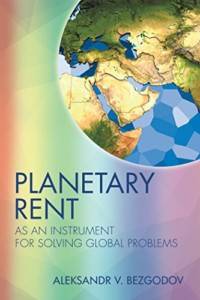Title: Planetary Rent: As An Instrument for Solving Global Problems
Author: Aleksandr Bezgodov
Publisher: XlibrisUK
ISBN: 978-1-5245-9761-0
Pages: 540
Genre: Economics, Philosophy of History, Bioethics
Reviewed by: Jason Lulos
Pacific Book Review
Think of it. A global partnership in which a planetary budget is established to promote environmental sustainability for all, renewable energy practices, and equality – rather than the current “global” economy which is based upon production, profit, and consumption. This is Bezgodov’s audacious but theoretically and practically logical, realistic plan to implement such a strategy. If successful, it would begin solving present and future problems: climate change, inequality, pollution, resource depletion, and even war. This is an interdisciplinary approach. It is well thought out, comprehensive, cogent, and extremely convincing. Some might react to this concept as being a new kind of oppressive world government, but that’s not what this is.
Bezgodov proposes the idea of a planetary budget, in philosophy and practice, based upon the idea of rent. Bezgodov takes time to define terms, tracing the idea of rent and its place in historical shifts from the Renaissance and Reformation, through the Industrial Age, to our current technological or Post-industrial Age. He discusses numerous theorists that span the bridge over what we might call the left-to-right political and economic methods. Bezgodov does not ascribe to any one ideology and that is the point. The aim of Planetary Rent is to establish a set of guidelines to address issues which do affect the entire planet. There is no room nor the time to cling to any ideology or outdated economic model.
The traditional idea of rent is a fee paid to one who owns a resource or service. Following this logic, we all borrow from the Earth: resources, services, and human labor. The new “rent” is humanistic and economic: if we borrow it, we should return it in as good if not better condition. Planetary Rent institutes a system which motivates the renter to pay for and be responsible with those resources, services, and labor. If resources are treated with more care and shared more globally, it will be less likely that we will face a shortage, need to deal with pollution or even a war over such depleted resources.
Again, this is not a plan to appropriate resources in order to extract income to enrich a select few. It is a harmonious, global system which will encourage equitable and biologically conscious practices. For example, since we all borrow air, it makes sense to rent it responsibly. Similar notions are tax exemptions for ecologically clean companies and larger rent fees for less responsible companies or nations. This establishes a clean energy fund while motivating responsible business practices. The concept of rent is more applicable than “tax” however, because it centers upon responsible borrowing and sharing. It is Bezgodov’s aim we move from an anthropocentric worldview to a more biocentric one.
There is much more to cover, including thoughts about socialization and technological progress, but not in the space of this short review. I would recommend the book to economists, historical theorists, and those interested in bioethics. The book’s argument should appeal to anyone who really wants to think about the future of the planet. It can be a daunting read in its conceptual detail, but the main arguments are clear and concise.


